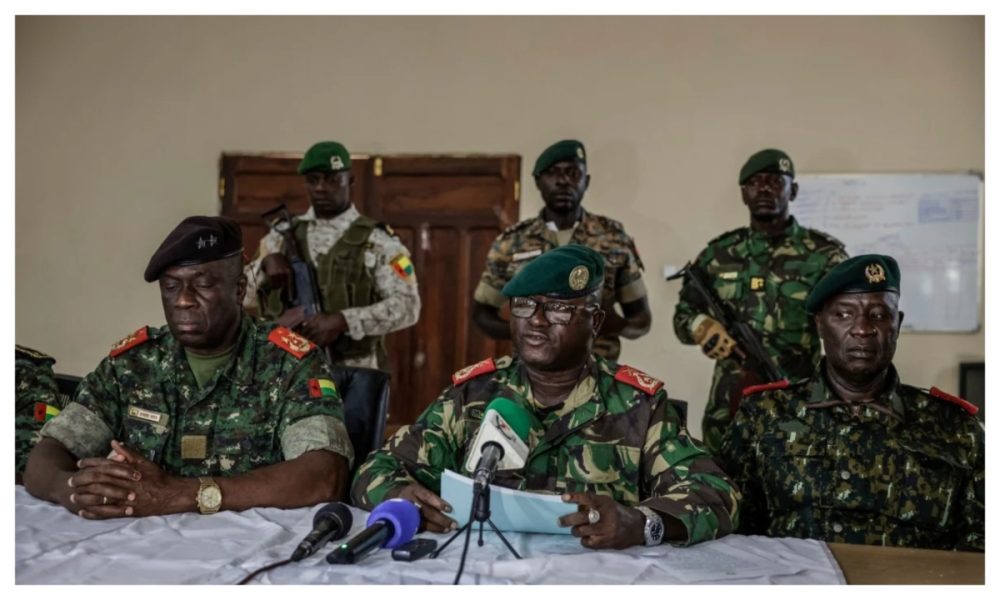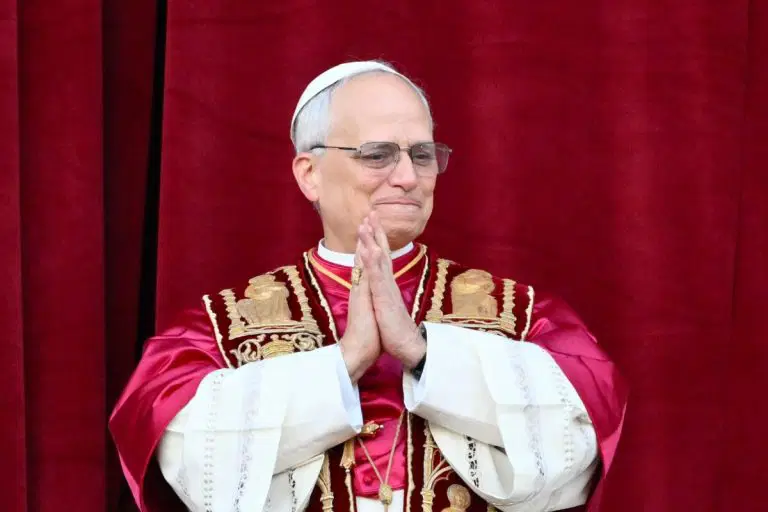Headline
Nigeria Presidential Election Flawed – Financial Times

London-based publication, Financial Times, has described the recently concluded 2023 presidential and National Assembly elections as badly flawed.
The publication also knocked the Independent National Electoral Commission over the conduct of the elections while it also advised the courts to take a hard look at the emergence of the president-elect, Bola Tinubu, if his victory was challenged in court by his opponents.
The London-based publication gave the advice in its editorial published yesterday. It added that Tinubu’s tally of 8.8 million in a country of 220 million people gave him the weakest of mandates.
It warned that the former Lagos State governor would be faced with one of the most difficult jobs in the world as Nigeria has been teetering on the edge of catastrophe with a breakdown of security and an almost total absence of growth.
READ ALSO: #NigeriaElections2023: Oshiomhole Reacts To Obi, Atiku’s Victory Claims
INEC had in the early hours of Wednesday, declared Tinubu, as the winner of the election and had proceeded with the issuance of certificate of return to him and his running mate, Kashim Shettima on Wednesday afternoon.
Chairman of INEC, Prof. Mahmud Yakubu, who declared the results noted that Tinubu polled a total of 8,794,726 million votes to defeat his closest challengers, Atiku Abubakar of the Peoples Democratic Party Peter Obi of the Labour Party and Rabiu Kwankwaso of the New Nigeria Peoples Party who polled 6,984,520 million; 6,101,533 million and 1,496,687 million votes, respectively.
However, The Financial Times argued that all that Nigeria needed was a clean election to reiterate the basic message of democracy where a sovereign people could choose its leaders, saying “sadly, it did not happen.”
It maintained that the, “election which appears to have delivered the presidency to Bola Tinubu, a wealthy political fixer running for the incumbent All Progressives Congress — was badly mismanaged at best.”
The publication added that the presidential election failed to set the example needed for West Africa, where too many national leaders have extended term limits or resorted to seizing power at gunpoint noting that, “Nigeria remains a democracy, but only just.”
Financial Times posited that the emergence of Obi as a viable third-party candidate had brought excitement and forced candidates to talk about policies, if only a little.
According to the paper, neutral observers had thought that INEC was in good shape and that they had high expectations that the electoral umpire’s promise to transmit voting tallies electronically from polling stations would eliminate ballot stuffing. It added that, “the outgoing President Muhammadu Buhari, had staked what remains of his tattered reputation on a clean contest.
READ ALSO: How 18 Presidential Candidates Shared 25.3 Million Votes
“Yet the INEC badly misfired. Voting started late in many districts, depriving millions of the right to vote. The system to upload results from 177,000 polling stations stuttered, causing legitimate concerns of vote tampering during long delays. “Violence was troubling. Party goons invaded many polling stations in what appeared to be blatant acts of intimidation. The Financial Times witnessed armed men remove a presidential ballot box in Surulere, Lagos.”
The London-based media outfit stated the official result put Tinubu on 37 per cent, from Atiku’s 29 per cent and Obi’s 25 per cent. It argued, however, that some individual results did not pass the smell test, which it stated, “includes Obi’s ever-so narrow victory in Lagos state, where crowds had greeted him like a rock star.”
It therefore advised that the next president must quickly remove the ruinously expensive fuel subsidy and rationalise the exchange rate system. It also advised that the security agencies, specifically the army and police, which are riddled with ineptitude and corruption needed urgent reform, stressing that “these basic steps are the minimum to begin to repair a deeply damaged country.” Pointing out that Tinubu campaigned partly on his ability to pick a strong team, the paper said if confirmed as president, he must name a cabinet of independent, competent and honest ministers. “Even Nigerians who did not vote for him will hope against hope for that,” it added.
Headline
Coup: Guinea-Bissau Junta Releases Six Held Opposition Politicians

Guinea-Bissau’s ruling junta on Tuesday released six members of the political opposition who had been detained since a coup last month.
The six freed opposition members are said to be close associates of Domingos Simoes Pereira, head of the PAIGC party that led the country to independence in 1974.
Pereira has been in custody since the coup.
In a statement by the High Military Command, the junta’s governing body, the releases are described as a sign of good faith and a step towards the return to constitutional normality and respect for international rights.
READ ALSO:Why West African Troops Overturned Benin’s Coup But Watched Others Pass
The army seized power on 26 November after ousting outgoing President Umaro Sissoco Embalo in the wake of a presidential vote.
After taking over, the military suspended the electoral process and announced it would take control of the West African country for a period of one year.
Recall that another opposition candidate, Fernando Dias, took refuge in Nigeria’s embassy, which granted him asylum, while Embalo fled the country after being briefly detained by the military at the time of the coup.
Meanwhile, Senegal’s Foreign Minister, Cheikh Niang, led a delegation to Guinea-Bissau, where he met with detained opponents and requested their release.
Headline
7 Territories Still Under Colonial Rule

Even though most nations became independent in the last century, some territories are still ruled by other nations.
Contents
1. Western Sahara
2. Guam
3. American Samoa
4. United States Virgin Islands
5. Falkland Islands / Malvinas
6. Gibraltar
7. Bermuda
Many of them remain on the United Nations list of non-self-governing territories, meaning they have not completed the process of decolonization. These places usually depend on bigger countries for laws, passports, defence, or political control.
In this article, Nigerian Tribune highlights 7 territories still under colonial rule:
READ ALSO:Nigeria Ranks World’s 102nd Happiest Nation, US, Germany Not Among 20 Top Counties
1. Western Sahara
Western Sahara remains one of the world’s biggest unresolved colonial issues. Morocco controls most of the territory, but the Polisario Front wants independence for the Sahrawi people. The UN is still trying to help both sides agree on a peaceful solution.
2. Guam
Guam is an important US territory in the Pacific, used heavily for American military operations. The US oversees its defence and foreign relations.
People living there are US citizens, but they cannot vote in presidential elections and do not have full representation in Congress.
READ ALSO:FULL LIST: US To Review Green Cards From 19 ‘Countries Of Concern’ After Washington Shooting
3. American Samoa
American Samoa has more local control than Guam, but the United States still decides immigration, defence, and foreign affairs.
Residents are considered US nationals and must apply if they want full citizenship.
4. United States Virgin Islands
The US Virgin Islands have their own legislature, but the United States makes major constitutional and political decisions. The territory depends heavily on US federal support.
5. Falkland Islands / Malvinas
The Falkland Islands remain controlled by the United Kingdom (UK), but Argentina has long disputed this claim, having been in control of the Islands for a few years before 1833.
The people living there voted strongly to stay British, yet the sovereignty dispute continues to appear in the UN.
READ ALSO:Six Countries With Highest Number Of Billionaires In 2025
6. Gibraltar
Gibraltar sits at the Southern tip of Spain. The United Kingdom controls it, but Spain insists the territory belongs to them.
Gibraltarians have repeatedly voted in favour of remaining British, but the dispute is still discussed within the UN Decolonisation Committee.
7. Bermuda
Bermuda is a British Overseas Territory situated in the North Atlantic Ocean. Although it manages most of its own internal affairs and enjoys a strong economy with modern facilities, the United Kingdom still handles its defence and represents it in global matters.
Headline
Russia-Ukraine War: Pope Leo Calls For Global Christmas Truce

Pope Leo XIV on Tuesday renewed his call for a global truce on Christmas Day, saying he felt “great sadness” after Russia “apparently rejected a request” for a pause in fighting.
Speaking to reporters at his residence in Castel Gandolfo near Rome, the Pope urged all sides involved in conflict to observe at least one day of peace.
“I am renewing my request to all people of goodwill to respect a day of peace — at least on the feast of the birth of our Saviour,” Leo said.
Recall that Russia invaded Ukraine in February 2022 and has repeatedly turned down calls for a ceasefire, arguing that any pause would give Ukraine a military advantage.
READ ALSO:Russian Strikes Kill Five In Ukraine, Cause Power Outages
“Among the things that cause me great sadness is the fact that Russia has apparently rejected a request for a truce,” the pope said.
Referring to conflicts worldwide, Leo added, “I hope they will listen and there will be 24 hours of peace in the whole world.”
The appeal came as fighting continued in eastern Ukraine. On Tuesday, Ukrainian forces withdrew from a town after heavy battles with Russian troops. Russian strikes killed three civilians and left thousands without power during winter temperatures.
READ ALSO:Trump Blasts Ukraine For ‘Zero Gratitude’ Amid Talks To Halt War
There was no indication of progress toward ending the war after separate meetings last weekend in Miami between the United States officials and negotiators from Russia and Ukraine. The conflict is nearing four years with no settlement in sight.
Earlier this month, Pope Leo met Ukrainian President Volodymyr Zelensky. When asked whether he would accept Zelensky’s invitation to visit Ukraine, the pope said, “I hope so,” while noting that it was not possible to say when such a visit could happen.
Leo also warned that efforts to secure peace without European diplomatic involvement were “unrealistic”, expressing optimism that President Donald Trump’s proposed peace plan could bring a “huge change” to the transatlantic alliance.

 News3 days ago
News3 days agoPHOTOS: New Era In Furupagha-Ebijaw As Okpururu 1 Receives Staff Of Office

 News2 days ago
News2 days agoUBTH CMD Marks 120 Days In Office, Expresses Commitment To Providing Conducive Working Environment

 News3 days ago
News3 days agoFG Declares Public Holidays For Christmas, New Year Celebrations

 News3 days ago
News3 days agoOPINION: Gumi And His Terrorists

 News2 days ago
News2 days agoFIRS Confirms NIN As Tax ID

 News2 days ago
News2 days agoOPINION: My Man Of The Season

 Metro2 days ago
Metro2 days agoFintiri Pardons Man Sentenced To Death For ‘Killing Herdsman In Self-defence’, Others

 News3 days ago
News3 days agoOPINION: Christmas And A Motherless Child

 News2 days ago
News2 days agoKWAM 1 Withdraws From Awujale Race, Ends Court Challenge

 Metro2 days ago
Metro2 days agoPetrol Tanker Crashes Into Akpabio’s Convoy, Kills Police Dispatch Rider




























